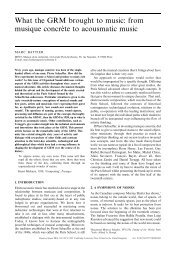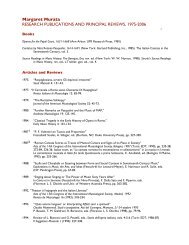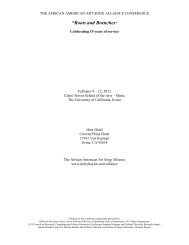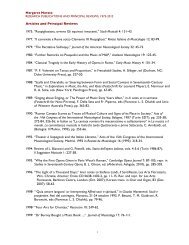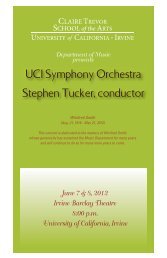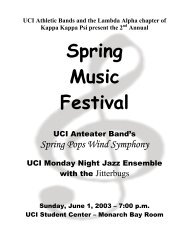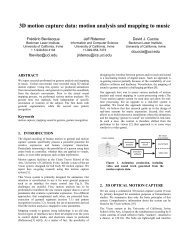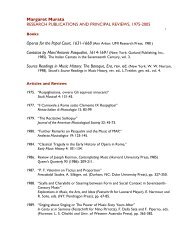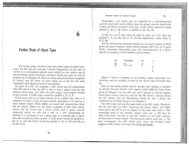amy bauer The Other of the Exotic: Balinese Music as Grammatical ...
amy bauer The Other of the Exotic: Balinese Music as Grammatical ...
amy bauer The Other of the Exotic: Balinese Music as Grammatical ...
Create successful ePaper yourself
Turn your PDF publications into a flip-book with our unique Google optimized e-Paper software.
<strong>The</strong> <strong>O<strong>the</strong>r</strong> <strong>of</strong> <strong>the</strong> <strong>Exotic</strong> 365<br />
‘[Ligeti] w<strong>as</strong> <strong>the</strong> most cosmopolitan <strong>of</strong> composers, but paradoxically, he<br />
remained very clearly defined in terms <strong>of</strong> his roots and language’, noted his<br />
fellow composer and conductor Esa-Pekka Salonen. 34 Salonen’s notion <strong>of</strong> <strong>the</strong><br />
cosmopolitan is no paradox if we consider Ligeti to have been a ‘rooted’ or<br />
situational cosmopolitan, one who maintained ties to his country and tradition<br />
while retaining an inherent idealism about <strong>the</strong> role <strong>of</strong> culture on <strong>the</strong> world<br />
stage. 35 Like <strong>the</strong> transnationalist and <strong>the</strong> globalist, <strong>the</strong> cosmopolitan acknowledges<br />
historical and cultural transition <strong>as</strong> normative and resists <strong>the</strong> claims <strong>of</strong> a<br />
particular nationalist or ethnic identity. A Hungarian Jew brought up in an<br />
E<strong>as</strong>tern Orthodox community in Romania, Ligeti survived both <strong>the</strong> Nazi and<br />
Soviet occupations but spent most <strong>of</strong> his career in Austria and Germany. His<br />
status <strong>as</strong> an international exile afforded a select vantage point from which he w<strong>as</strong><br />
able to survey <strong>the</strong> musical and cultural legacy <strong>of</strong> both E<strong>as</strong>t and West. Thus<br />
Ligeti’s cosmopolitan imagination w<strong>as</strong> rooted in a very specific cultural place<br />
and time, his openness to <strong>the</strong> influences <strong>of</strong> non-Western music, art and science<br />
tempered by nostalgia and fatalism. His music nei<strong>the</strong>r mimics nor merges with<br />
<strong>the</strong> vernacular sources which inspired it, but functions instead <strong>as</strong> an imaginative<br />
creation which communicates with a global audience.<br />
Martin Scherzinger h<strong>as</strong> written perceptively on <strong>the</strong> production and reception<br />
<strong>of</strong> ‘Africanness’ in Ligeti’s works <strong>as</strong> it relates both to <strong>the</strong> public performance <strong>of</strong><br />
several piano pieces along with <strong>the</strong> music <strong>of</strong> <strong>the</strong> Aka pygmies <strong>of</strong> Central Africa<br />
and to a subsequent recording which joined eight Aka songs with six <strong>of</strong> <strong>the</strong><br />
Études and two works by Steve Reich. 36 Notes accompanying <strong>the</strong> public concerts<br />
and recording were fraught with some <strong>of</strong> <strong>the</strong> hoariest orientalist clichés (<strong>the</strong> le<strong>as</strong>t<br />
egregious <strong>of</strong> which w<strong>as</strong> <strong>the</strong> presentation <strong>of</strong> African musicians <strong>as</strong> a collective<br />
representation <strong>of</strong> ‘Africanness’, not one <strong>of</strong> <strong>the</strong>m being identified by name).<br />
Hence media reception <strong>of</strong> <strong>the</strong> compact disc displayed a strong element <strong>of</strong> anxiety<br />
about <strong>the</strong> sociopolitical ramifications <strong>of</strong> a pairing which, <strong>as</strong> Scherzinger notes,<br />
w<strong>as</strong> ‘largely sublimated into an argument on aes<strong>the</strong>tic grounds’ (2006, p. 229).<br />
This element <strong>of</strong> anxiety is part <strong>of</strong> a modernist cosmopolitan discourse which,<br />
while rooted in <strong>the</strong> local, is ‘always surreptitiously imperial’, in <strong>the</strong> words <strong>of</strong><br />
Timothy Brennan (2001, p. 81).<strong>The</strong> editors <strong>of</strong> Public Culture maintain that part<br />
<strong>of</strong> modernity’s core project is an attempt to separate and purify individual<br />
cultures, ‘each <strong>of</strong> which is better seen – more historically seen – <strong>as</strong> a “qu<strong>as</strong>i<br />
object” located at <strong>the</strong> intersection <strong>of</strong> a range <strong>of</strong> o<strong>the</strong>r cultural qu<strong>as</strong>i objects’<br />
(Pollock, Bhabha, Breckenridge and Chakrabarty 2000, p. 587).Where does one<br />
draw <strong>the</strong> line between <strong>the</strong> Western and non-Western ‘objects’ <strong>of</strong> a cross-cultural<br />
fant<strong>as</strong>y such <strong>as</strong> ‘Galamb borong’? As Scherzinger admits, ideological projection<br />
is a two-way street, <strong>as</strong> demonstrated by a critical comparison <strong>of</strong> <strong>the</strong> formal<br />
properties shared by certain African musics and <strong>the</strong> compositions <strong>of</strong> Ligeti and<br />
Reich. African music, once entrained to social practice, is celebrated <strong>as</strong> abstractsounding<br />
form, while <strong>the</strong> music <strong>of</strong> Ligeti and Reich is rec<strong>as</strong>t <strong>as</strong> embodied<br />
practice (and, I might add, given a commercial boost by f<strong>as</strong>hionable appeals to<br />
multiculturalism). 37 Tenzer describes a contemporary <strong>Balinese</strong> culture, engaged<br />
<strong>Music</strong> Analysis, 27/ii-iii (2008)<br />
© 2009 <strong>The</strong> Author.<br />
Journal compilation © 2009 Blackwell Publishing Ltd.



